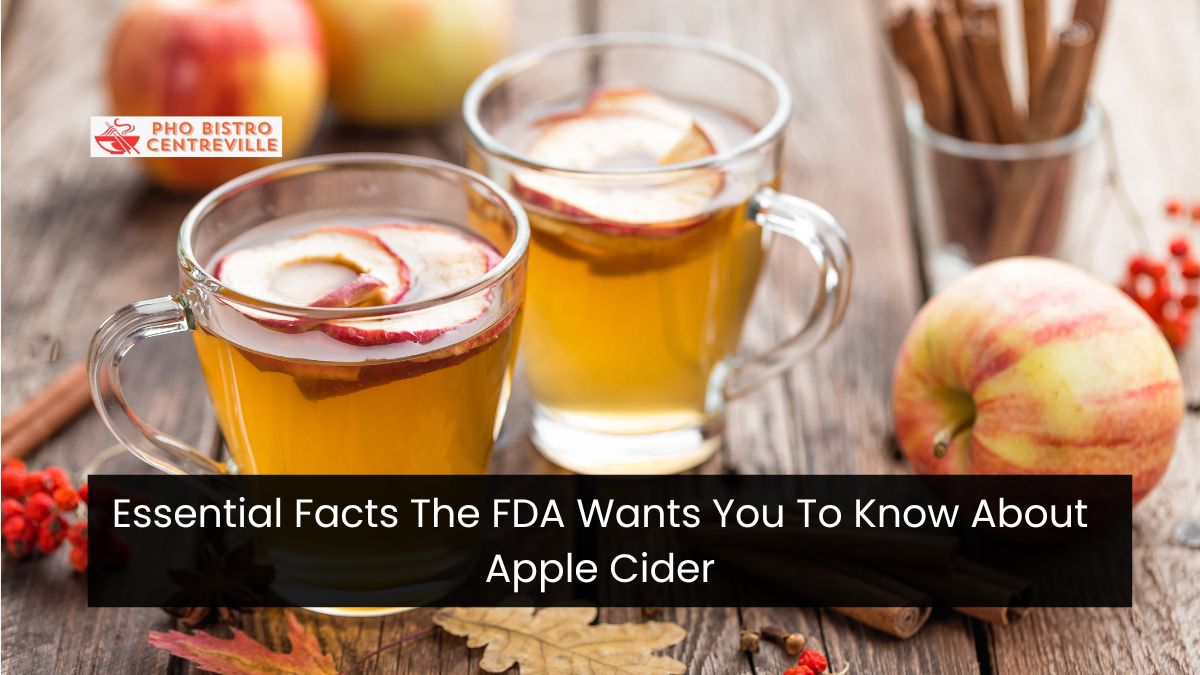During the fall, apple cider is a popular drink that can be enjoyed cold or warm with spices. It is commonly found at pumpkin patches and local markets. When drinking cider, it’s essential to make sure it has been pasteurized.
If apple cider isn’t processed correctly, it can carry bacteria that may make you sick. Here’s what the U.S. Food & Drug Administration (FDA) wants you to know about safely consuming apple cider, particularly if purchasing it from your local market or making it home.
What Is Pasteurization?
Pasteurization makes liquids and foods safer by using high heat to kill harmful bacteria. It’s often used in making drinks like milk and juice, as well as apple cider. This helps protect people with weak immune systems who can get sick more easily from bacteria in unpasteurized products. Some vulnerable groups include:
Children
Pregnant individuals
Older adults
People with health problems like diabetes, cancer, HIV/AIDS, or who have had organ transplants.
When apple cider is pasteurized, it is made safer to drink because it lowers the risk of getting sick.
If you drink unpasteurized cider, you could get food poisoning with symptoms like diarrhea, vomiting & stomach pain. These symptoms can be more severe & last longer for people with weaker immune systems. The FDA suggests choosing pasteurized cider to stay safe.
Why Pasteurization Is Important for Apple Cider
When making cider, sometimes apples that have fallen on the ground are used, which are called ground-harvested apples. These apples might be dirty and could have bacteria or animal waste on them. Even if they are cleaned well, there could still be bacteria left, so pasteurization is necessary.
Also, apples used in large-scale production are cleaned in large quantities. When apples are cleaned at home, they are scrubbed carefully, but in mass production, they are washed together, which may not remove all bacteria. Pasteurization helps make sure that any harmful bacteria are destroyed before the cider is ready to drink.
How Pasteurization Impacts the Shelf Life of Cider
Pasteurization makes apple cider last longer & reduces the chances of getting sick. Olivia Roszkowski, a chef who teaches cooking with plant-based foods, says pasteurization is essential for keeping liquids like cider fresh for a longer time.
Apple juice can be treated with heat or UV light to kill bacteria. Dr. Tamika Sims says that UV light can stop bacteria from multiplying and make the product safer to drink.
Is Unpasteurized Cider Safe?
Although you can buy unpasteurized cider at local markets, it’s important to know the risks. If you choose to buy unpasteurized cider, remember to:
Check for a warning label on unpasteurized products that the FDA says must be there. This label tells people about the dangers of eating unpasteurized products.
Ask vendors about the pasteurization process When buying cider from a local market or small producer, make sure to ask how they pasteurize it.
Store the cider appropriately. Unpasteurized cider has a much shorter shelf life than its pasteurized counterpart, lasting only about one to two weeks in the refrigerator.
How to Tell if Apple Cider Has Been Pasteurized
How do you tell if your apple cider has been pasteurized? Here are some quick tips:
Check the expiration date: Pasteurized cider usually lasts longer, up to a few weeks in the fridge. Unpasteurized cider goes bad quicker.
Where to find cider: Pasteurized cider can be found in the cold or regular areas, but unpasteurized cider must always be kept cold to stay fresh.
FDA warning labels: By law, all unpasteurized products must have a label that tells people with weak immune systems about possible dangers.
Can You Pasteurize Cider at Home?
If you’re making your own cider at home or buying fresh cider that hasn’t been pasteurized, you can pasteurize it yourself to make sure it’s safe. Here are some simple steps to follow:
Warm the cider in a pot with hot water until it reaches a temperature of 160°F.
Keep the temperature steady for one minute to make sure all the bad bacteria are destroyed.
Put the cider in a clean container in the fridge and drink it within a couple of weeks.
But Dr. Sims says that pasteurizing cider at home may not be as reliable as when done commercially, especially for people with weak immune systems. If you’re worried about food safety, it’s better to choose store-bought pasteurized cider.
How Long Does Cider Last?
Pasteurized cider can last for four weeks in the fridge after opening. Unpasteurized cider only lasts for one to two weeks before it starts to spoil. Keep all cider in the fridge once opened.
Are There Additives in Pasteurized Cider?
One thing to keep in mind is that some shelf-stable ciders may have extra things added to them, like:
Preservatives
Added sugars
Artificial flavors
These extra things are usually in products that are heated up a lot to last longer in the store. If you want something more natural, find cider that is made simply and doesn’t have anything extra added to it.
The Bottom Line
Whether you like apple cider cold or warm, it’s a tasty drink for the season. But it’s important to think about the safety risks of cider that hasn’t been pasteurized, especially if you’re at higher risk. Pasteurization gets rid of bad bacteria & makes the cider last longer, so it’s a safer choice for everyone.
Always look for an FDA warning label on unpasteurized products when buying apple cider. If you’re making cider at home, pasteurizing it yourself can make it safer, but it might not be as trustworthy as store-bought pasteurized cider.
Most importantly, make sure to drink your cider carefully & make sure you & your family can enjoy it without any concerns.

